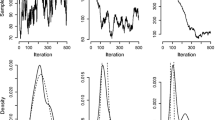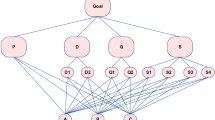Abstract
We study three classes of diversity relations over menus arising from an unobserved categorization of alternatives in the form of a partition. A basic diversity relation declares a menu to be more diverse than another if and only if for every alternative in the latter there is an alternative in the former which belongs to the same category. An extension of a basic diversity relation preserves its weak and strict parts and possibly makes additional diversity judgements between hitherto incomparable menus. A cardinality-based extension is an extension which ranks menus on the basis of the number of categories that exist in each menu. We characterize each class axiomatically. Two axioms satisfied by each of the three classes are Monotonicity, which says that larger menus are at least as diverse, and No Complements, which rules out certain complementarities between alternatives in generating diversity.
Similar content being viewed by others
Notes
See, for instance, Tversky and Russo (1969).
Similar remarks apply to van Hees (2004), Dutta and Sen (1996), Bavetta and Del Seta (2001) and Peragine and Romero-Medina (2006). In all these papers, the axiomatic approach explicitly links binary relations over sets (freedom rankings) with a binary relation over alternatives, which usually (but not always) gives an objective measure of similarity between alternatives. A slightly different approach is taken by Klemisch-Ahlert (1993) where menus are subsets of \({\mathbb {R}}^{n}\). This allows for taking convex hulls of menus and transforming menus by adding vectors from alternatives.
A preorder is a binary relation \(\succsim \) which is reflexive (\(A\succsim A\) for every \(A\in Z\)) and transitive \((A\succsim C\) whenever \(A\succsim B\) and \(B\succsim C\)). A weak order is a preorder \(\succsim \) which is also complete (\(A\succsim B\) or \(B\succsim A\) for any A and B).
Letting \(E^{\succsim }(A)=\{x\in A:A\succ A{\setminus }\{x\})\) for every A as in Puppe (1996), we can rewrite A2 as follows: \(x\in E^{\succsim }(A\cup \{x\})\Leftrightarrow x\in E^{\succsim }(B\cup \{x\})\) for every \(B\subset A\). This is equivalent to saying that the map \(E^{\succsim }\), taken as a possibly empty-valued choice correspondence, satisfies the classical \(\alpha \) axiom and a weakening of the classical \(\gamma \) axiom.
A4 is a weakening of the Independence axiom in Pattanaik and Xu (1990), which says that \(A\succsim B\) if and only if \(A\cup \{x\}\succsim B\cup \{x\}\) whenever \(x\notin A\cup B\). The difference between our formulation and theirs is that in the models of diversity relations we are interested in, adding a new alternative to a menu does not necessarily lead to an improvement in diversity. In contrast, in the pure cardinality ranking over menus which Pattanaik and Xu (1990) study, adding a new alternative to a menu always leads to an improvement. Hence we need to make sure that adding x improves diversity in both A and B in our version of this property.
We should explicitly thank Clemens Puppe for suggesting A6 to us.
For instance, if language and subject matter both define attributes of books, a Spanish book on calculus would have two attributes.
References
Barbera S, Bossert W, Pattanaik P (2004) Ranking sets of objects. In: Barbera S, Hammond P, Seidl C (eds) Handbook of utility theory. Kluwer Academic, Dordrecht
Bavetta S, Del Seta M (2001) Constraints and the measurement of freedom of choice. Theory Decis 50:213–238
Dowding K, van Hees M (2009) Freedom on choice. In: Anand P, Pattanaik P, Puppe C (eds) Handbook of rational and social choice. Oxford University Press, Oxford
Dutta B, Sen A (1996) Ranking opportunity sets and Arrow impossibility theorems: correspondence results. J Econ Theory 71:90–101
Edelman P, Jameson R (1985) The theory of convex geometries. Geometriae Dedicata 19:247–270
Jones P, Sugden R (1982) Evaluating choice. Int Rev Law Econ 2:47–65
Klemisch-Ahlert M (1993) Freedom of choice: a comparison of different rankings of opportunity sets. Soc Choice Welf 10:189–207
Kreps D (1979) A representation theorem for preference for flexibility. Econometrica 47:565–577
Lahiri S (2003) Justifiable preferences over opportunity sets. Soc Choice Welf 21:117–129
Nehring K, Puppe C (2002) A theory of diversity. Econometrica 70:1155–98
Nehring K, Puppe C (2003) Diversity and dissimilarity in lines and hierarchies. Math Soc Sci 45:167–183
Nehring K, Puppe C (2004a) Modelling cost complementarities in terms of joint production. J Econ Theory 118:252–264
Nehring K, Puppe C (2004b) Modelling phylogenetic diversity. Resour Energy Econ 26:205–35
Nehring K, Puppe C (2009) Diversity. In: Anand P, Pattanaik P, Puppe C (eds) Handbook of rational and social choice. Oxford University Press, Oxford
Pattanaik P, Xu Y (1990) On ranking opportunity sets in terms of freedom of choice. Recherches Economiques Louvain 56:383–390
Pattanaik P, Xu Y (2000) On diversity and freedom of choice. Math Soc Sci 40(2):123–130
Peragine V, Romero-Medina A (2006) On preference, freedom and diversity. Soc Choice Welf 27:29–40
Puppe C (1996) An axiomatic approach to preference for freedom of choice. J Econ Theory 68:174–199
Qin D (2015) On justifiable choice functions over opportunity sets. Soc Choice Welf 45:269–285
Ryan M (2014) Path independent choice and the ranking of opportunity sets. Soc Choice Welf 42:193–213
Ryan M (2016) Essentiality and convexity in the ranking of opportunity sets. Soc Choice Welf 47:853–877
Tversky A, Russo EJ (1969) Substitutability and similarity in binary choices. J Math Psychol 6:1–12
van Hees M (2004) Freedom of choice and diversity of options: some difficulties. Soc Choice Welf 22:253–266
Author information
Authors and Affiliations
Corresponding author
Additional information
Publisher's Note
Springer Nature remains neutral with regard to jurisdictional claims in published maps and institutional affiliations.
Helpful comments from Matthew Kovach, Clemens Puppe, Matthew Ryan and anonymous referees are gratefully acknowledged. Levent Ülkü was financially supported by the Asociación Mexicana de Cultura.
Rights and permissions
About this article
Cite this article
Galindo, J., Ülkü, L. Diversity relations over menus. Soc Choice Welf 55, 229–242 (2020). https://doi.org/10.1007/s00355-020-01237-3
Received:
Accepted:
Published:
Issue Date:
DOI: https://doi.org/10.1007/s00355-020-01237-3




